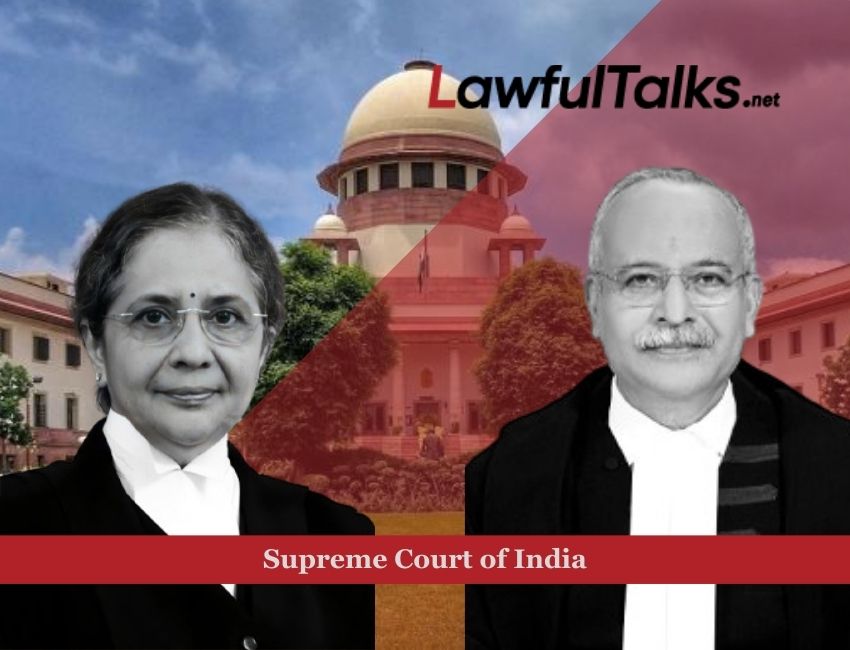Allahabad HC Sets Aside Afzal Ansari's Conviction, Allows Him to Continue as MP

The Supreme Court bench comprising Justices Bela Trivedi and Satish Chandra Sharma has dismissed the Appeal filed by TMC MP Abhishek Banerjee and his wife Rujira Banerjee, challenging the Enforcement Directorate's summons in relation to a scam case. The couple has raised objections against the summons of ED where attendance is required in the national capital, but Calcutta is the duo's original residence.

The Respondent-ED issued multiple summons to Appellant No. 1 under Section 50 of the Prevention of Money Laundering Act (PMLA) to appear before them in New Delhi. Appellant No. 2 also received summons, but both of them did not appear and furnished a reply seeking time to comply with the summons. On August 18, 2021, the ED summoned them again. Appellant no. 2 requested to be examined in Kolkata, citing the fact that the alleged cause of action occurred in West Bengal. Appellant no. 1 appeared but later failed to appear for another summons, but furnished a reply seeking four weeks’ time. The appellant no. 1 was further served with another summons, which he challenged before the High Court.
Meanwhile, the respondent filed a complaint against the Appellant no. 2 in the Court of Chief Metropolitan Magistrate for non-compliance of the summons. The Court of Chief Metropolitan Magistrate took cognisance of the complaint and ordered Appellant no. 2 to appear in court, which she also challenged in the High Court.
Both the petitions before the High Court were dismissed.
Mr. Kapil Sibal, appearing for Appellant no. 1, argued that Section 50 of PMLA merely indicates the substantive power of the ED to summon but does not provide the procedure for exercise of such power.
Mr. Abhishek Manu Singhvi added that summoning the Appellant no. 2 in Delhi is illegal and reeks mala fide because Appellant no. 2, being a homemaker and a mother of two children, was asked to appear in Delhi although Respondent-ED had a zonal office in Kolkata.
In view thereof, Senior Counsel, Mr. S.V. Raju for Respondent-ED, submitted that Section 91 Cr.P.C. neither encompasses any territorial jurisdictional limit nor does it contain any provision for women, minors, or the elderly akin to Section 160 Cr.P.C. A police officer has to resort to Section 91 Cr.P.C. to mandate the provision of any document. Hence, Section 91 Cr.P.C. cannot be equated with the powers under Section 50 of PMLA. Further, he emphasised that ED has the power to summon any person whose attendance is considered necessary.
After hearing all the submissions from both parties, the court noted that Section 71 of the PMLA gives PMLA overriding effect over other laws. According to Section 65 PMLA, the provisions of the Cr.P.C. shall apply insofar as they are not inconsistent with the provisions of the PMLA in respect of arrest, search and seizure, attachment, confiscation, investigation, prosecution and all other proceedings under the Act. References were made to Sections 4(2) and 5 as well.
"Thus, having regard to the conjoint reading of Section 71 and Section 65 of the PMLA as also Section 4(2) and Section 5 of the Code, there remains no shadow of doubt that the provisions of PMLA will have the effect notwithstanding anything inconsistent therewith contained in any other law for the time being in force, including the provisions of the Cr.P.C," the Court observed.
Furthermore, the court pointed out stark inconsistencies between section 50 PMLA and section 160 CrPC, such as :
- That Section 50 is gender neutral, whereas s.160 is not.
- While S.160 of CrPC pertains to "investigation,” S.50 of PMLA concerns "inquiry.”
- Statements recorded by the Authorities under Section 50 of PMLA are not hit by Article 20(3) or Article 21 of the Constitution, whereas the statements recorded under S.160 CrPC cannot be used in evidence except for the limited purpose stated in the proviso to Section 162 of the Code.
As to the question of whether the procedure was violative of Articles 20 and 21, the Court referred to the case of Vijay Madanlal Choudhary v. Union Of India, 2022 Scc Online Sc 929, wherein Section 50 of PMLA was considered constitutionally valid, thus this claim was also not considered.
The Court noted that as per the sub-section (3) of Section 50, all the persons summoned are bound to attend in person or through authorised agents as the officer may direct and are bound to state the truth upon any subject respecting which they are examined or make statements, and to produce the documents as may be required. As per sub-section (4) thereof, every proceeding under sub-sections (2) and (3) is deemed to be a judicial proceeding within the meaning of Section 193 and Section 228 of the IPC. As per sub-section (4) of Section 63, a person who intentionally disobeys any direction issued under Section 50 is liable to be proceeded against under Section 174 of the IPC.
Ultimately, the Supreme Court held that ''In that view of the matter, we do not find any substance in the challenge made by the appellants to the summons issued to the appellants under Section 50 of the PMLA. Suffice it to say that we do not find any illegality in the said orders passed by the concerned court and that the said complaint shall be proceeded further by the said court in accordance with law.''
Thus, both appeals being devoid of merits were dismissed.
Advocates for Appellant: Sr. Adv. Mr. Kapil Sibal, Sr. Adv. Mr. Gopal Sankaranarayanan & Ors.
Advocates for Respondents: Mr. S.V. Raju, A.S.G., Mr. A.K. Panda, Sr. Adv. & Ors.
Case Title: Abhishek Banerjee & Anr. v. Directorate of Enforcement, Crl.Appeal/2221/2023

Akshaj Joshi
Law Student
Latest Posts
Categories
- International News 19 Posts
- Supreme Court 347 Posts
- High Courts 361 Posts


















































































































































































































































































































































































































































































































































































































































































































































